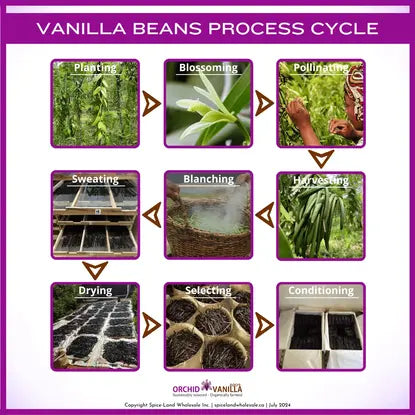
Vanilla Beans Process Cycle: From Planting to Perfection

Vanilla beans, cherished for their rich, complex flavors, undergo a meticulous process from planting to final conditioning. Each stage is essential in developing the aromatic qualities that make vanilla one of the world’s most sought-after spices. Let’s explore the journey of vanilla beans, from the initial planting of the orchid to the final drying and conditioning, and see how each step contributes to crafting this exquisite spice.
1. Planting: The Beginning of the Journey
The vanilla bean journey starts with the careful planting of Vanilla planifolia orchids, typically grown in tropical climates. These delicate plants thrive in warm, humid conditions, requiring expert care to cultivate and create the perfect environment for their growth. This stage is the foundation of the entire vanilla production process, demanding patience and precision from experienced farmers.
2. Blossoming: A Rare and Short-Lived Bloom
Vanilla orchids bloom for just one day, and during this short window, the flower must be pollinated. This brief blooming period is critical, as the success of the vanilla bean harvest depends on timely pollination. The orchid's rare bloom makes this stage particularly challenging and significant in the bean's development.
3. Pollinating: A Delicate Hand-Pollination Process
Because natural pollinators for vanilla orchids are rare, hand-pollination is the most common method. Skilled workers transfer pollen from the male part of the flower to the female stigma, ensuring the successful production of vanilla beans. This labor-intensive process requires precision and care, marking an important step in the bean’s life cycle.
4. Harvesting: Picking at the Perfect Time
Once pollinated, the vanilla beans must be harvested at just the right moment—when they are fully matured but before they split. Timing is everything, as this ensures the beans have developed their maximum flavor while still in the best condition for further processing.
5. Blanching: Locking in Quality
After harvest, the beans undergo a quick blanching process, where they are dipped in hot water to stop further ripening and preserve their quality. This step is essential for maintaining the integrity of the beans and setting the stage for the next critical phase—sweating.
6. Sweating: Enhancing Flavor and Aroma
Sweating is where the magic happens. The beans are wrapped and stored in a warm, humid environment, allowing enzymes to develop the signature vanilla flavor and aroma. This stage enhances the bean's complexity, deepening the flavors that make vanilla such a valuable spice.
7. Drying: Preserving the Richness
Following the sweating process, the vanilla beans are laid out to dry in the sun. This step can take several weeks as the beans are exposed to sunlight during the day and stored in the dark at night. The slow drying process reduces the moisture content and concentrates the flavor, ensuring the beans are preserved for long-term storage.
8. Selecting: Ensuring Only the Best
Once dried, each vanilla bean is carefully inspected for quality. Only the beans that meet strict criteria for size, appearance, and aroma are chosen for high-grade vanilla products. This selection ensures that only the finest vanilla beans make it to market.
9. Conditioning: The Final Touch
The final step in the process is conditioning, where the selected beans are stored in wooden boxes for several months. This aging process allows the beans to develop their full flavor potential, enhancing their aromatic qualities and ensuring they are ready for culinary use.
Conclusion: The Art of Vanilla Bean Production
From planting to the final conditioning, every step in the vanilla bean production cycle is crucial in creating the rich, aromatic beans we all love. The dedication and expertise involved in this process ensure that each vanilla bean reaches its full potential, offering unparalleled depth and flavor. Understanding the meticulous care behind the production of vanilla beans allows you to truly appreciate the exceptional quality that this spice brings to your kitchen.






